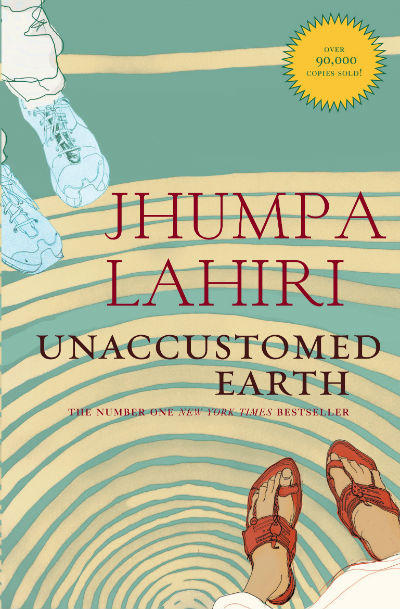We have written before about Jhumpa Lahiri’s thought provoking and accomplished work The Namesake and we have been reading some of her earlier and later works since. We’ll be sharing our views on these works through a few posts.
Jhumpa Lahiri made her debut with a collection of short stories called Interpreter of Maladies released in 1999, followed by a novel “The Namesake” in 2003, and a second collection of stories called “Unaccustomed Earth” that was first published as a collection in 2008 and was very well received with top place in The New York Times Best-Seller List. Since then, Bloomsbury has also published these stories as e-books.
| Book Title | : | Unaccustomed Earth |
| Author | : | Jhumpa Lahiri |
| Publishers | : |
Vintage Books; Published: (5 September 2013) RHI; Published: (1 May 2009) Random House Audio; Published: (1 April 2008) |
| # of Pages | : |
344 (Paperback) 352 (Hardcover) 858 KB, 344 (Kindle EBook) |
| # of Chapters | : | 21 |
| Purchase Link(s) | : |
This lovely collection of short to medium length stories starts with an apt epigraph:
Human nature will not flourish, any more than a potato, if it be planted and replanted, for too long a series of generations, in the same worn out soil. My children have had other birthplaces, and, so far as their fortunes may be within my control, shall strike their roots into unaccustomed earth.
Nathaniel Hawthorne
The Custom-House

Unaccustomed Earth by Jhumpa Lahiri | Book Cover
Published by Bloomsbury,the first edition of Unaccustomed Earth had a beautifully rich cover page showing the Seas that separate the continents. The latest edition, as shown above, highlights the difference between generations by simply showing the pair of feet and the footwear going from old-fashioned chappals to branded sneakers.
The collection is divided in two parts. Part one contains four standalone stories, while part two comprises of three segments that tell the story of two characters with three different narrators.
This Is Here In For You
Part One : Unaccustomed Earth
This first story in the collection revolves around the varied lives and perceptions of three generations. An Indian born Bengali – migrated to America father, his American born daughter Ruma and her son with American husband Adam – a boy called Akash.
Ruma has recently moved from Brooklyn to Seattle where her husband Adam has found a better paying job and a bigger house where they can raise a family. Ruma has given up her legal career to be a mother at home for Akash and has another baby on the way.
Ruma grew up with her Bengali parents trying to hold on to another way of life and has always been torn between the Indian and American heritage. While Ruma’s mother reluctantly accepted her marriage to Adam and later reconciled with her when she had Akash, her father has always been a distant but solid part of her life. Not emotionally involved too much, not too affected by her demands or choices as her mother was, but there. Now her mother has passed away and Ruma’s brother Romi has moved to New Zealand, she feels obligated to ask her father to come and live with her, even though she is not sure that she wants it.
But what Ruma doesn’t realize is that his father has also learnt to enjoy the independence that comes with being a retiree widower in America where he has no social obligations any more. He discovers the joy of travelling and has even found a love interest in Mrs Bagchi whom he met on is tours through Europe. Ruma isn’t aware of these changes in her father and while she agonises over his visit, the stay proves helpful for both to understand each other’s choices to some extent.
Hell-Heaven
There is no bigger prison then the human mind, it can turn our life from heaven to hell and hell to heaven in a heartbeat when the love begets jealousy and unrequited love can literally kill you in a moment of despair.
Like many other immigrant couples, Usha’s father Shyamal married her mother Aparna when she was much younger than him and neither of them had a chance to know each other before marriage. But now they have been married for a few years, they have learnt to live with each other and they have Usha, a girl of seven, who is telling us this story as a grown woman. It is at this stage in their life that Pranab Chakraborty enters it – a lonely young man who has recently come to America and is pining for home. He soon becomes part of their lives, Pranab Kaku for Usha and a brother-in-law cum friend for Aparna. Aparna and Pranab share similar taste in music, in food, in their approach to life and he is a much more suited companion for a young woman married to an older, quieter man.
But things change as Pranab starts dating Deborah and eventually marries her. Her mother’s heaven has turned to hell of jealousy and loss, but life must go on and so it does until twenty-three years later Pranab and Deborah divorce. However, time has also healed Aparna’s wounds and the mother and her grown daughter forge a bond of understanding over what had happened all those years ago.
A Choice of Accommodations
This short story revolves around the relationship of Amit and Megan when they leave their two little girls to attend a wedding of Amit’s old friend Pam. Pam was the daughter of headmaster of Langford boarding school where Amit lived for a few years, when his parents decided to move back to Delhi. The story focuses on Amit’s feelings and insecurities from past and future as everything seems to converge on this day of Pam’s wedding towards a breakdown in his own marriage which seems to have gone stale over the years. Everything that can go wrong does go wrong, from the weather to Megan’s dress, even their choice of expensive accommodation doesn’t succeed in rekindling the romance, but they do find some part of each other again before the story ends.
Only Goodness
This is a story of Sudha and her younger brother Rahul. Being born and raised in America, Sudha learnt to enjoy alcohol as part of the growing up experience at college and introduced Rahul to it. However, in Rahul’s case it turned into severe alcoholism over years. He was brilliant at school when younger, but his alcoholism resulted in his expulsion from university and what his parents perceive as a self-destruction of what could have been a successful life.
Meanwhile Sudha moved on to London, studying for a post graduate degree in Economics and met Roger. They married and had a son named Neel. All these years, Sudha has felt guilty, she has blamed herself for Rahul’s troubles and so when he reaches out to her, she invites him to visit her. Rahul convinces her that he has reformed, given up alcohol and is learning to live his life again, only to let Sudha down eventually by getting drunk while looking after Sudha’s infant son.
Nobody’s Business
Sangeeta is an American girl born to Bengali parents and is trying to escape the suitors who seem to call her from nowhere to propose marriage. In defiance to the Bengali customs, she is in relationship with an Egyptian man called Farouk. But over the course of a few months, Sang’s roommate Paul discovers some disturbing facts about Farouk and his relationship with other women who all seem to be needy, insecure and too eager to look after him. By the end of the story, Paul and Sang confronts Farouk, only to break Sang’s heart while Farouk carries on.
Part Two:
Part two is the story of Hema and Kaushik – told through three segments called “Once in a Lifetime” which covers their childhoods, “Year’s End” which is mostly Kaushik’s story after the death of his mother and “Going Ashore”, where fate brings them together again to part forever.
Hema had sort of known Kaushik even before she was born. Hema’s mother Shibani and Kaushik’s mother Parul met in a park when Hema’s mother wasn’t aware that she might be pregnant. The two Bengali women soon became fast friends in a foreign land of America and eventually the families became closer than relatives until the Chaudhuris – Kaushik’s parents – moved to Mumbai. They left a lot of their household items to Hema’s family including Kaushik’s clothes that Hema inherited and wore until she grew out of them.
A few years later, the Chaudhuris moved back, Kaushik now a boy of sixteen and Hema a girl of thirteen. Hema’s home became Kaushik’s temporary home until his parents bought a house and Hema’s room became Kaushik’s room. While Hema’s troubles weren’t any more complicated than having a crush on Kaushik, Kaushik was wrapped in his own painful world where his mother was dying of breast cancer.
Soon the families drifted apart and after her mother’s death Kaushik went to study at Swarthmore. His father eventually married a widow named Chitra and bought her back from Bengal with her two daughters – Rupa and Piu- from a previous marriage. In the few days that Kaushik spent with them over a Christmas holiday ended up badly as he could not come to terms with a strange woman inhibiting the place where he could still see his mother in her last days. Kaushik left without saying goodbyes and never went back to that home again.
After finishing college, Kaushik drifted through Central and Latin America and embarked on a life as photo-journalist without quite planning on it. While Hema became an academic studying Latin and ancient Romans. All her adult life she had been in a relationship with a married man in a hope that he would divorce his wife. This was not to be. So, at the age of thirty-seven she accepted reality and decided to get married to Navin. An arranged marriage that promised the end to her loneliness.
She came to Rome for a few months before going to India for her marriage, living in a colleague’s flat and working on Etruscan history. And it was here that she bumped into Kaushik, after all these years. They both went headlong into an affair – with an understanding that Hema will leave to get married and Kaushik will move to Hong Kong for a new job as soon as this holiday was over. They both had their own lives and existences to return to. However profound their connection may be, it cannot replace day-to-day life they have created over years when the promises are only half-made with the other half safely kept withdrawn. What could have been remains an unfulfilled dream.
As we noted above, the collection received positive response from readers as well as critics. Like The Namesake, Jhumpa Lahiri draws on the themes of immigration and conflicting cultural expectations from the children born to Bengali parents living in America. Her stories are so striking because they resonate with real-life experiences of migrants, especially her descriptions of the Bengali community living in the United States through seventies and eighties. These were mostly scholarly man who acquired doctorates in various fields at American universities and stayed on to continue brilliant academic careers. They went back to India to marry and their children grew up in America but the drive to do well at school was ever present at home and the children also became successful in their own careers, except for occasional stumbling and misfits. These children were expected by their parents to marry into Indian community, but they have more in common with the American children and so inevitably the families became mixed. Eventually, most parents do come to terms with the international marriages of their children, the mixed genetic make-up of their grandchildren and embrace the freedom of their adopted country.
But for the Indian born migrants, the first few years and sometimes decades of the adapted life in the strange lands of Europe and USA are also frightening with the unfamiliarity of the day to day life. They are so far away from the only way of life they have known. They are hesitant to follow American customs, afraid of what it is doing to their children, reluctant to change the food and living habits. Friendships are made over the fact of shared heritage, on the strength of being Bengalis, so they can socialise with other people who understand them, irrespective of the fact that they might never have crossed paths with each other if they had all remained in India.
In starting, immigration is an adventure, living with paraffin heaters, seeing snow for the first time. Then it becomes a shock – a life sentence of being foreign in a small town and suddenly finding it harder to navigate the rituals of it compared to taking on the biggest cities of the world in the first tide of youth.
For the children born outside India though, it is different. They want to blend in, to belong the way the think their friends and classmates belong. So they change the way they talk, hide how their family lives at home, try to avoid the lengthy holidays in India where everything feels strangely different. The following passage from Only Goodness highlights all this:
Sudha had slipped through the cracks, but she was determined that her little brother should leave his mark as a child in America. She sought out all the right toys for him, scavenging from yard sales the Fisher Price barn, Tonka trucks, the Speak and Say that made animal sounds, and other things that she’d discovered in the playrooms of her friends. She asked her parents to buy him the books she’d been read by her first teachers, Peter Rabbit and Frog and Toad.
As much as the two generations feel that they are drifting away from each other, what they have in common, is the sense of ‘not belonging’. The parents still identify themselves as Indians and stick to the customs of their homeland, even though they will probably never return to India to live. And the children like Sudha, Hema or Kaushik identify themselves as Americans, but no matter where they go in the world, people assume they are Indians and treat them as such. No wonder they all envy the sense of belonging that comes from living at the same place through your entire life and may be for generations.
Summary:
We enjoyed these stories very much, especially the detailing of characters. A very good collection indeed…
9 out of 10.
Quick Purchase Links:
- Buy Book From Amazon India – Kindle EBook
- Buy Book From Amazon India – Paperback
- Buy Book From Amazon US – Paperback
- Buy Book From Amazon India – Hardcover
- Buy Book From Amazon US – Hardcover
- Buy Book From Amazon India – Audiobook
If you already have read the book do share your remarks and thoughts via comments below. Does this review help you in making your decision to buy or read the book? Do not forget to share this article with your friends over various social networks via Twitter, Facebook, Google Plus and others. And yes, you may like to subscribe to our RSS feeds and follow us on various Social networks to get latest updates for the site to land right in your mail box.
 ThinkerViews – Views And Reviews Personal views and reviews for books, magazines, tv serials, movies, websites, technical stuff and more.
ThinkerViews – Views And Reviews Personal views and reviews for books, magazines, tv serials, movies, websites, technical stuff and more.



